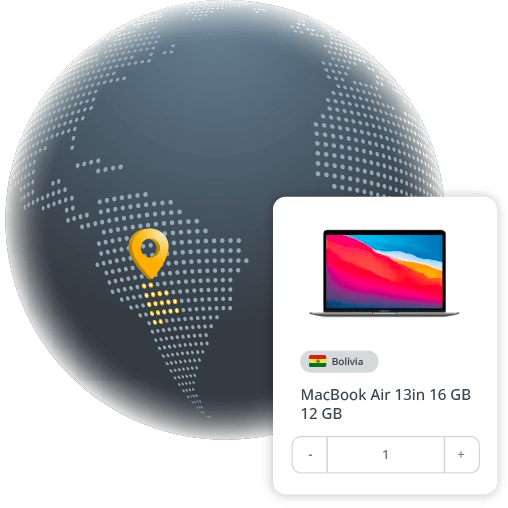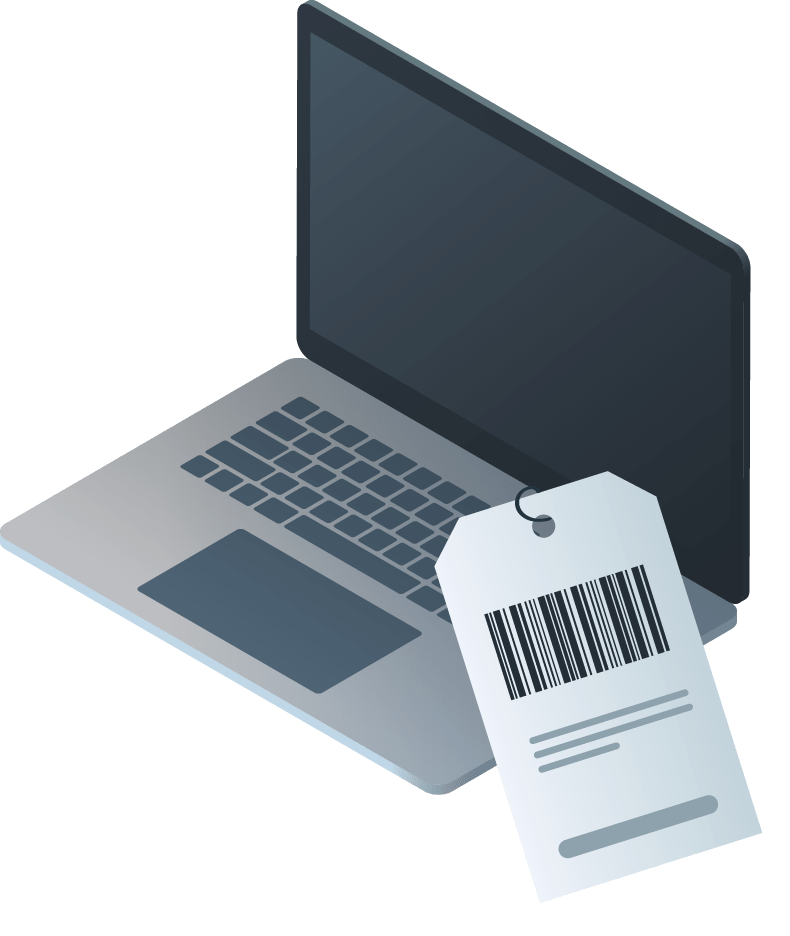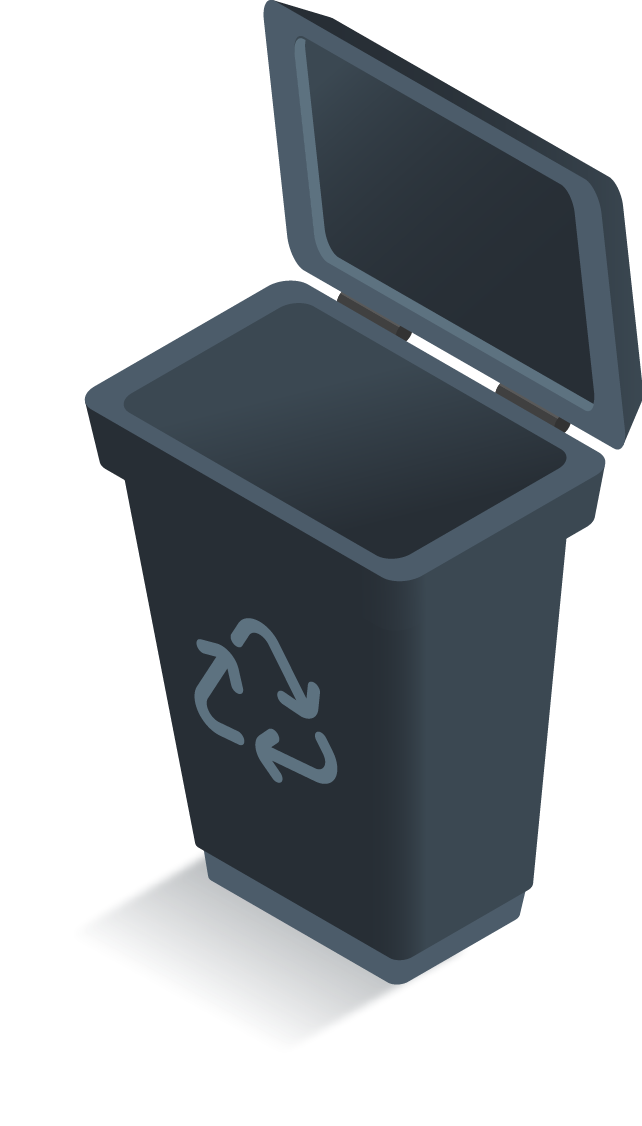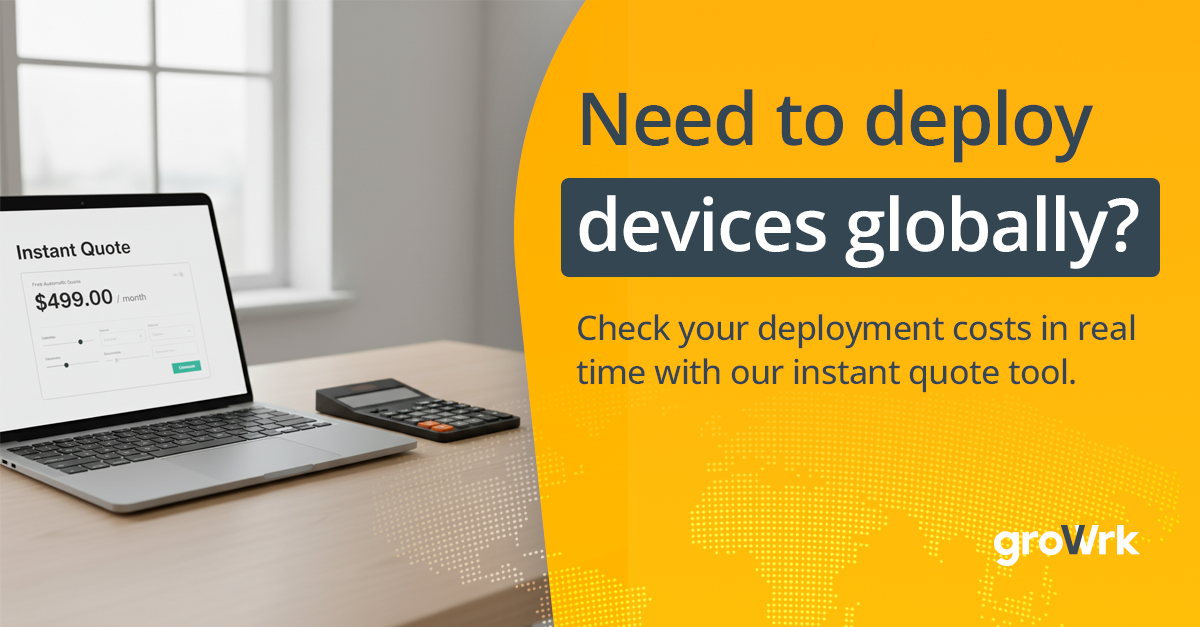How to send IT equipment to Bolivia
Empower Your Remote Teams in Bolivia with Hassle-Free IT Equipment Delivery! At GroWrk, we make it easy to equip your remote teams in Bolivia with the laptops, servers, and tech they need—seamlessly and stress-free. From smooth logistics to effortless customs clearance and full compliance, we handle every detail so you can focus on scaling your business with confidence. Let’s get your team set up for success with our detailed guide.

At a glance
Bolivia is a growing hub for IT and digital transformation in South America, with a rapidly evolving tech ecosystem. The country has been investing in IT infrastructure, digital education, and software development, making it an increasingly attractive destination for IT outsourcing and remote tech teams.
|
CURRENCY Boliviano (BOB) |
OFFICIAL LANGUAGE Spanish Along with 36 indigenous languages |
TIME ZONE Bolivia Time (BOT) GMT-04:00 |
|
CUSTOMS DUTY ON ELECTRONICS Typically, 5% to 40% customs duties and 14.9% VAT |
SHIPPING LEAD TIME 4-8 days Standard shipping times to Bolivia vary based on the origin and shipping method. |
IT OUTSOURCING MARKET Growing steadily, with increasing focus on software development, digital services, and e-commerce solutions. The market is expected to reach $ 470.38 million by 2029. |
Overview of IT operations in Bolivia

Customs duties: IT equipment, such as laptops, desktops, and accessories, may be subject to duties ranging from 5% to 40%, depending on the classification and intended use. Businesses importing large quantities may be eligible for preferential duty rates under certain trade agreements. Additionally, special permits may be required for high-value or specialized IT equipment, which can impact the final importation cost.
HS Codes: Accurate classification is crucial for determining applicable duties and taxes, as misclassification can result in unexpected fees, delays, or even shipment rejections by Bolivian Customs. Ensuring the correct HS Codes and proper documentation not only expedites clearance but also helps businesses manage costs effectively.
Value Added Tax (VAT): Bolivia applies a 14.9% VAT on most imported goods, including IT equipment, calculated on the total value, which includes shipping fees, customs duties, and any applicable insurance costs. Businesses should ensure accurate VAT calculations to avoid discrepancies during customs clearance. Additionally, certain exemptions or reduced VAT rates may apply for imports related to government projects, educational institutions, or research initiatives.
Additional taxes: Imports to Bolivia may also be subject to a Financial Transaction Tax (FTT) of 0.3% and possibly other specific taxes depending on the product category.
Tax exemptions: Some exemptions or reductions may apply for government, educational, or research-related imports, particularly for projects that contribute to national development, innovation, or scientific research. Businesses involved in these sectors should verify their eligibility with the Bolivian Customs Authority to benefit from reduced tax rates or waived duties.
Shipping IT equipment to Bolivia: What you need to know
| Commercial documents |
|
| Duties and taxes |
|
| Compliance and regulation documents |
|
| Import restrictions |
|
| New vs. Used equipment |
|
| Customs clearance process |
|
| Penalties or fines for non-compliance |
|
Checklist for sending laptops to Bolivia
When shipping laptops to Bolivia, it’s important to follow a few best practices to ensure the process goes smoothly, and your equipment arrives safely and on time. Here are some helpful shipping tips:

Select trusted couriers: Choose reliable couriers such as GroWrk, DHL, UPS, FedEx, or ECOBOL (Empresa de Correos de Bolivia) for international shipping. These carriers offer tracking and are experienced with Bolivian customs clearance and logistics.
Check service levels: Select the appropriate shipping option based on urgency. Express shipping (3-6 days) for high-priority deliveries. Standard shipping (7-14 days) for cost-effective options.
Use high-quality packaging: Secure laptops with sturdy, padded boxes and protective materials like bubble wrap, foam inserts, or air cushions to prevent damage during transit.
Disassemble where possible: If shipping accessories like chargers, docking stations, or monitors, package them separately to prevent damage. Remove detachable components if applicable.
Label clearly: Ensure the recipient’s name, address, and contact details are correctly labeled. Mark the package as "fragile" to encourage careful handling.
Accurate product descriptions: On the commercial invoice, provide a detailed and accurate description of the laptop, including its brand, model, and serial number. Inaccurate descriptions may cause customs delays.
Value declaration: Declare the correct value of the laptop to avoid under- or over-declaring, which could lead to customs inspections or fines. The declared value determines any applicable duties and taxes.
Customs declarations: All shipments into Bolivia must go through customs clearance. Include: Bolivian Customs Declaration (Declaración Única de Importación - DUI), commercial invoice, and packing list.
Proof of origin: If applicable, attach a certificate of origin to take advantage of preferential trade agreements, such as CAN (Andean Community) or MERCOSUR, which may reduce duties.
Understand import duties & taxes: Laptops are generally subject to 0% import duty. However, imports are taxed with 13% VAT (Impuesto al Valor Agregado - IVA), 3% Transaction Tax (IT), and customs processing fees based on the CIF value (Cost + Insurance + Freight).
Pre-pay duties and taxes: Some couriers allow for pre-paid duties and taxes to simplify customs clearance and prevent the recipient from facing unexpected charges upon arrival.
Protect against loss or damage: Consider purchasing shipping insurance for high-value laptops to protect against loss, theft, or damage during transit.
Compliance with Bolivian regulations: Laptops with wireless features may need to comply with ATT (Autoridad de Regulación y Fiscalización de Telecomunicaciones y Transportes) standards if imported commercially or in large quantities.
Use tracking tools: Major couriers provide real-time tracking—monitor shipments closely to anticipate customs clearance updates and delivery progress.
Stay in touch with the recipient: Notify the recipient about the expected delivery timeline, tracking updates, and any customs-related requirements to avoid delays.
Expect weather and seasonal delays: Bolivian logistics can be affected by rainy season (especially in the lowlands), road conditions, and public holidays, such as Carnaval or national independence celebrations.
Bolivian domestic delivery options: For final delivery, consider local options like ECOBOL, DHL Bolivia, Jet Cargo, or Transporte El Alto for dependable national distribution.

Average cost of IT Equipment in Bolivia
Laptops (Business Grade):
- Mid-range: BOB 7,000 - BOB 15,000
- High-end: BOB 15,000 - BOB 30,000
High-end models such as Apple MacBook Pro, Dell XPS, and Lenovo ThinkPad are priced on the higher end.
Monitors (Business Grade):
- Standard: BOB 1,500 - BOB 4,000
- Ultrawide/4K: BOB 5,000 - BOB 12,000
Monitors from trusted brands like Dell, Samsung, and LG typically range within these prices, with 4K or ultrawide models costing more.
Desktops (Business Grade):
- Standard Desktop PC: BOB 4,000 - BOB 12,000
- Workstation Desktop (for high-performance tasks): BOB 12,000 - BOB 40,000+
Prices depend on the brand and specifications, with options from HP, Lenovo, and Apple among the most common.
Printers (Laser):
- Standard Office Printers: BOB 1,500 - BOB 4,000
- High-Volume Printers: BOB 8,000 - BOB 25,000
Leading brands such as HP, Canon, and Brother offer a wide range of models for office environments.
Public holidays & IT work hours to plan your shipment
Key public holidays in Bolivia:
- New Year's Day – January 1
- Plurinational State Foundation Day – January 22
- Carnival – February/March (variable, 2 days)
- Good Friday – March/April (variable)
- Labor Day – May 1
- Corpus Christi – May/June (variable)
- Andean New Year – June 21
- Independence Day – August 6
- All Saints Day – November 1
- Christmas Day – December 25
Typical work hours for IT professionals
- Standard workweek
- The typical workweek is 40 hours, with standard business hours from 8:30 AM to 6:30 PM, Monday to Friday, with a two-hour lunch break from 12:30 PM to 2:30 PM.
- Many IT companies, especially those working with international clients, have adopted more flexible working hours to accommodate different time zones.
- Employees usually take a lunch break of 1 to 2 hours, which is longer than in many Western countries.
- Overtime
- Overtime is regulated under Bolivian labor laws.
- Employees may work up to 2 hours of overtime per day.
- Overtime pay is typically 2 times the hourly wage on weekdays and 3 times on Sundays and public holidays.
- Some companies offer compensatory time off instead of overtime pay.
- Public holiday work
- Working on public holidays is generally not required unless specifically agreed upon.
- If an employee works on a public holiday, they are entitled to double pay or an alternative day off.
- Many businesses close completely during major holidays like Carnival, Christmas, and Independence Day.
What to consider when retrieving IT equipment from employees in Bolivia
| Local delivery and logistics services |
|
| Inventory management |
|
| Logistics challenges for remote locations |
|
| Equipment agreement with employees |
|
How to dispose of IT equipment in Bolivia
E-waste recycling:
- Certified E-Waste handlers: Businesses must dispose of IT equipment through registered e-waste recycling providers in compliance with Bolivia's environmental laws.
- Municipal collection points: Some major cities have established e-waste collection points for the proper disposal of electronic equipment.
- Manufacturer take-back programs: Several electronics manufacturers have begun implementing take-back programs in Bolivia.
Data Destruction
- Wipe data completely: Use certified software to erase all stored data to prevent unauthorized access.
- Physical destruction: For highly sensitive data, consider shredding or degaussing hard drives and solid-state drives (SSDs).
- Certification: Request data erasure certificates for corporate compliance purposes.
Repurposing or donating
- Support education & communities: Donate working computers to schools, non-profits, or community programs in underserved areas.
- Internal reuse: Older devices can be reassigned for secondary tasks before being disposed of.
- Refurbishment programs: Partner with local refurbishment centers that can extend the life of IT equipment.
Manufacturer take-back programs
Brands like Dell, HP, and Apple offer take-back programs for safe recycling or refurbishment. These programs ensure that old or used IT equipment does not end up in landfills, helping to reduce environmental impact. Many manufacturers provide incentives, such as discounts on new devices, for customers who return old equipment for proper disposal.
Certified E-Waste recycling providers
Always work with certified third-party disposal services that are recognized by Bolivia’s local authorities. These providers ensure that your IT equipment is recycled by environmental standards, handling all necessary paperwork to provide certificates of destruction or recycling to confirm that everything was disposed of properly.

Local IT Outsourcing Solutions in Bolivia
You can streamline your IT logistics and asset management with GroWrk’s comprehensive global solution. Whether it’s shipping equipment or managing IT assets across multiple regions, GroWrk helps you stay compliant and efficient every step of the way. Here’s why GroWrk is the ideal partner for managing your IT assets in Bolivia:

| 1. Wide global coverage |
GroWrk operates in 150+ countries (including Bolivia), delivering IT gear anywhere without a hitch. We know Bolivia’s rules inside out—so your deployment is fast, compliant, and built for your needs. |
| 2. End-to-end asset management |
From procurement to deployment, maintenance, and secure disposal, GroWrk manages the full lifecycle of IT assets. This allows businesses to focus on growth while ensuring smooth and secure IT operations across Bolivian locations. |
| 3. Intuitive platform for easy deployment |
Our centralized platform simplifies IT equipment management by enabling real-time tracking, shipment monitoring, and asset usage insights. This reduces administrative workload and enhances operational efficiency across Bolivian offices. |
| 4. Smooth delivery and equipment retrieval |
GroWrk ensures the smooth delivery of IT equipment to employees throughout Bolivia, including in challenging locations. We also manage the return of devices from departing employees, making the process cost-effective, streamlined, and hassle-free. |
| 5. Compliance with Bolivian import regulations |
We handle all aspects of IT import compliance, including customs clearance, VAT, and electronic equipment regulations. By aligning with Bolivian customs requirements, GroWrk prevents delays and ensures a smooth supply chain. |
| 6. Efficient repairs and maintenance |
From routine servicing to urgent repairs, we coordinate IT equipment upkeep to minimize downtime. Our network of expert technicians throughout Bolivia ensures that devices remain in optimal working condition, allowing employees to stay productive. |
| 7. 24/7 Support for peace of mind |
Our dedicated IT asset management support team is available round-the-clock to assist with IT asset management, logistics, and troubleshooting. With GroWrk, businesses in Bolivia can rely on expert support anytime. |
Procure, configure, and deploy your IT devices from one platform


